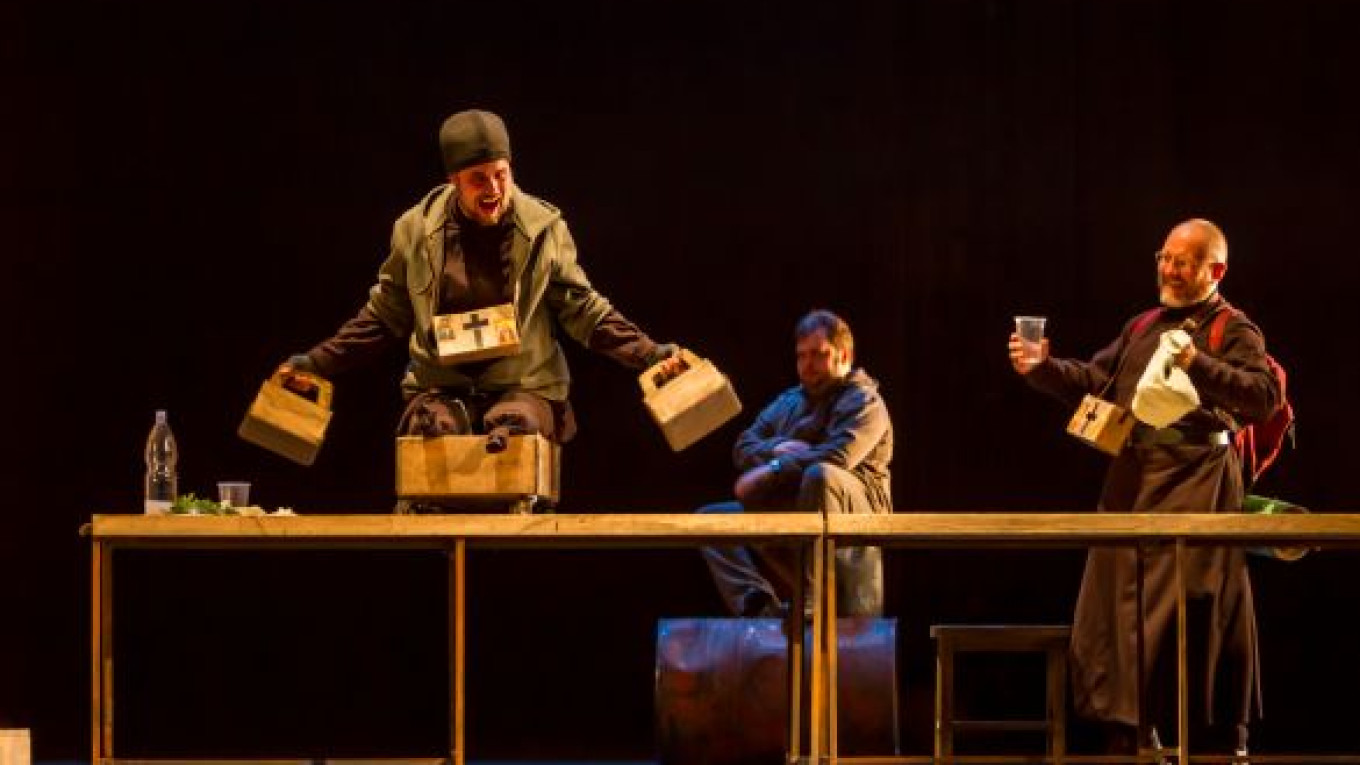Less than a week after returning from Perm late last month to see a new production of Wolfgang Amadeus Mozart's opera "The Marriage of Figaro," I headed back to the Ural Mountains, this time to Yekaterinburg, for yet another operatic premiere.
The opera in Yekaterinburg, at its Theater of Opera and Ballet, was Modest Mussorgsky's "Boris Godunov," staged as part of the theater's 100th anniversary celebration. Particularly drawing me to the production was the presence of director Alexander Titel, artistic head of the Moscow opera troupe Stanislavsky and Nemirovich-Danchenko Musical Theater for the past 21 years.
I first encountered a Titel production two decades ago at the Bolshoi Theater. The opera was Nikolai Rimsky-Korsakov's "The Night Before Christmas," and Titel's staging struck me as perhaps the most captivating to be found in those days on the Bolshoi stage. Since then, I have witnessed nearly 20 other Titel productions. A few have misfired, but most have shown him to be a director of exceptional skill and imagination. Notable works in recent seasons include Jacques Offenbach's "The Tales of Hoffmann" and Vladimir Kobeikin's madcap "Hamlet (Danish) (Russian) Comedy," both at the Stanislavsky and Nemirovich-Danchenko.
Titel began his career as a director at the Yekaterinburg theater in the early 1980s. Returning to stage an opera for the first time since 1991, he came up with what I consider to be among his very finest work.
"Boris Godunov" exists in two versions, the first completed in 1869 and rejected by St. Petersburg's Mariinsky Theater, in part because of the lack of a major female role. The second, dating from three years later, the Mariinsky eventually accepted and premiered. In reworking the opera, Mussorgsky discarded one of the original scenes and added three others, two of which are set in Poland and feature a female role: a noblewoman named Marina Mnishek, who has attached herself to Grigory, the pretender to the Russian throne, with the aim of joining him in leading a Polish army to overthrow Tsar Boris and converting Russia to Catholicism.
For their production, Titel and the Yekaterinburg theater chose the less frequently performed 1869 version of the opera. And though I rather missed the glorious lyrical music in the Polish scenes of the revised version, Mussorgsky's initial attempt at "Boris" struck me, not for the first time, as the more dramatically powerful of the two.
The "Boris" of 1869, without the distraction of Marina Mnishek, focuses attention almost entirely on the opera's principal protagonists: Tsar Boris, tortured in mind and soul for bringing about the murder of the tsarevich, Dmitry, the last surviving son of Ivan the Terrible, and illegitimately acquiring the Russian throne; and the long-suffering people of Russia, as represented by the chorus in the scenes at Novodevichy Monastery, at Boris' coronation in the Kremlin and on Red Square.
In the Yekaterinburg production, Titel manages with remarkable success to enhance the dramatic effect still further by moving the action forward from the turn of the 17th century to modern times and by playing the opera's seven scenes without an intermission. Moreover, he devised action for both principals and choristers that clearly lays out the story and, at every moment, or at least every important moment, seems entirely motivated.
Titel's longtime Stanislavsky and Nemirovich-Danchenko colleague designer Vladimir Arefyev created a set for the production in the form of a semicircular wall with crumbling plaster and exposed red bricks that was moved around in such a way as to serve very effectively for both outdoor and indoor scenes.
Besides Titel and Arefyev, two other Muscovites were involved in the premiere of "Boris." Helikon Opera bass Alexei Tikhomirov, imposing both vocally and physically, proved a near-perfect choice for the title role, and tenor Oleg Polpudin, from the Stanislavsky and Nemirovich-Danchenko, sang robustly as the pretender Grigory.
The monk Pimen, who chronicles the tale of Boris' ascension to the Russian throne, was solidly handled by Mariinsky bass Alexander Morozov, while the rest of a generally excellent cast was drawn from the Yekaterinburg theater's own roster of singers. Among the latter, Oleg Savka performed with particular distinction in the brief but key tenor role of the Holy Fool (the Yurodivy), whom a leading American expert on Russian music, Richard Taruskin, has characterized as expressing both the voice of Mussorgsky himself and "the voice of Russia's self-consciousness … defining the nation-yurodivy whose mission it is, earned through suffering, to bear the truth to the world."
German maestro Michael Guttler, a frequent guest conductor at the Mariinsky over the past decade who is due to lead Giuseppe Verdi's "Macbeth" at the Bolshoi next spring, provided strong musical leadership and drew exceptionally fine playing from the theater's orchestra.
Related articles:
A Message from The Moscow Times:
Dear readers,
We are facing unprecedented challenges. Russia's Prosecutor General's Office has designated The Moscow Times as an "undesirable" organization, criminalizing our work and putting our staff at risk of prosecution. This follows our earlier unjust labeling as a "foreign agent."
These actions are direct attempts to silence independent journalism in Russia. The authorities claim our work "discredits the decisions of the Russian leadership." We see things differently: we strive to provide accurate, unbiased reporting on Russia.
We, the journalists of The Moscow Times, refuse to be silenced. But to continue our work, we need your help.
Your support, no matter how small, makes a world of difference. If you can, please support us monthly starting from just $2. It's quick to set up, and every contribution makes a significant impact.
By supporting The Moscow Times, you're defending open, independent journalism in the face of repression. Thank you for standing with us.
Remind me later.


